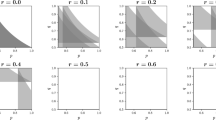Abstract
An impossibility result pertaining to the aggregation of individual judgements is thought by many to have significant implications for political theory, social epistemology and metaphysics. When members of a group hold a rational set of judgments on some interconnected questions, the theorem shows, it isn’t always (logically) possible for them to aggregate their judgements into a collective one in conformity with seemingly very plausible constraints. I reject one of the constraints which engender the dilemma. The analogy with the lottery paradox, I argue, shows that rational belief needn’t be consistent. So the alleged implications of the dilemma are dispelled.
Similar content being viewed by others
Notes
A comprehensive list of papers pertaining to the discursive dilemma and the doctrinal paradox can be found in http://personal.lse.ac.uk/LIST/doctrinalparadox.htm.
The example is mine; Douven and Romeijn argue in the abstract.
The assumption is thought to be so obvious, that it is almost invariably presupposed, rather than defended, as a constraint on aggregation. Thus, Hartmann, Pigozzi and Sprenger (2007, my italics) characterise the aggregation problem as pertaining to the “aggregation of individual consistent judgments…into an equally consistent group judgment”. Pigozzi (2006, p. 295, my italics), in a similar vein, suggests that when “the set of propositions on which most group members agree…fail[s] to satisfy consistency…we need to look for the second (or third…) best outcome”. For Pauly and van Hees (2006, p. 583), the problem is “the question of how the requirement of logical consistency constrains the aggregation of judgements”, and Douven and Romeijn (2007, p. 304) think that all the conditions except systematicity are “hardly contestable”.
The qualification ‘(fairly) obvious’ is necessary, since human beings are logically imperfect, and aren’t capable of complying with the requirement as it stands. Perhaps an even better formulation is the following: it is irrational knowingly to believe incompatible propositions. For brevity, I will omit the qualification. But, anyway, in the case of the lottery, the logical relations are all obvious and known, so neither reformulation eliminates the paradox.
The qualification is required for the same reason: human beings aren’t capable of believing all the logical consequences of what they believe even if these are restricted to propositions they can comprehend.
References
Adams, E. (1975). The logic of conditionals. Dordrecht: Reidel.
Douven, I., & Romeijn, J. (2007). The discursive dilemma as a lottery paradox. Economics and Philosophy, 23, 301–319.
Edgington, D. (1992). Validity uncertainty and vagueness. Analysis, 52, 193–204.
Foley, R. (1992). The epistemology of belief and the epistemology of degrees of belief. American Philosophical Quarterly, 29, 111–124.
Goldman, A. (2004). Group knowledge versus group rationality: Two approaches. Episteme, 1, 1–22.
Hartmann, S., Pigozzi, G., & Sprenger, J. (2007). Reliable methods of judgment aggregation. Working paper.
Kaplan, M. (1981). Rational acceptance. Philosophical Studies, 40, 129–145.
Kornhauser, L. A., & Sager, L. G. (1986). Unpacking the court. Yale Law Journal, 96, 82–117.
Kornhauser, L. A., & Sager, L. G. (2004). The many as one: Group choice in paradoxical cases. Philosophy & Public Affairs, 32, 249–276.
Kyburg, H. E. (1961). Probability and the logic of rational belief. Middletown: Wesleyan University Press.
Levi, I. (2004). List and Pettit. Synthese, 140, 237–242.
List, C., & Pettit, P. (2002). Aggregating sets of judgments: An impossibility result. Economics and Philosophy, 18, 89–110.
Pauly, M., & Van Hees, M. (2006). Logical constraints on judgement aggregation. Journal of Philosophical Logic, 35, 569–585.
Pettit, P. (2001). Deliberative democracy and the discursive dilemma. Philosophical Issues (supplement to Nous), 11, 268–299.
Pettit, P. (2003). Groups with minds of their own. In F. Schmitt (Ed.), Socializing metaphysics. Lanham: Rowman and Littlefield.
Pigozzi, G. (2006). Belief merging and the discursive dilemma: an argument-based account to paradoxes of judgment aggregation. Synthese, 152, 319–332.
Author information
Authors and Affiliations
Corresponding author
Rights and permissions
About this article
Cite this article
Weintraub, R. A solution to the discursive dilemma. Philos Stud 152, 181–188 (2011). https://doi.org/10.1007/s11098-009-9471-x
Published:
Issue Date:
DOI: https://doi.org/10.1007/s11098-009-9471-x




